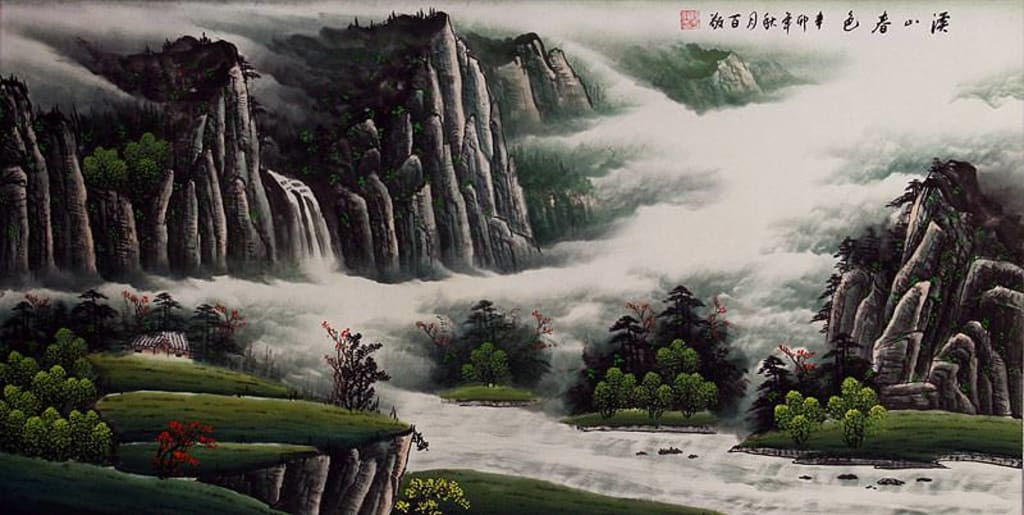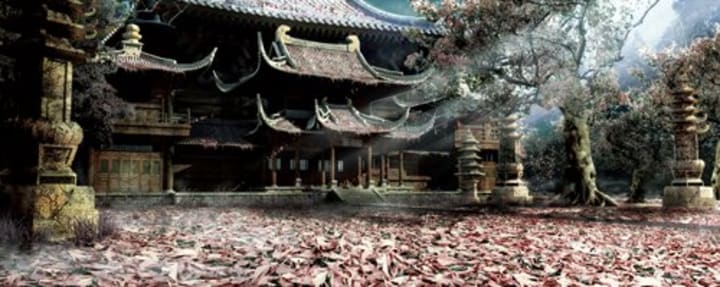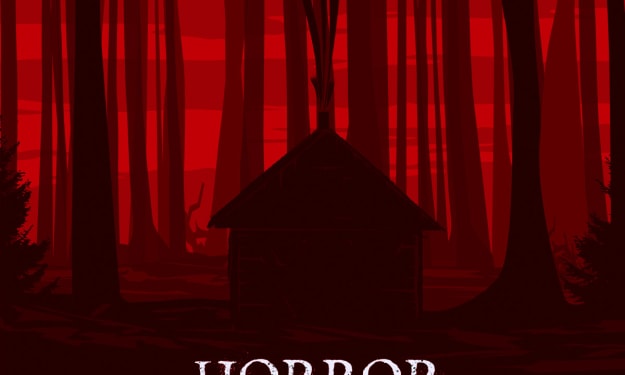
With Halloween right around the corner and my brain firmly sequestered in ancient China, I thought I should share some of the creepier folk tales. Below you will find my condensed versions of classic tales of ancient Chinese ghost stories. Enjoy!
The Ghost Who Was Foiled
In Chinese myth, there are ghosts of many kinds, but the ghosts of those who have hung themselves are to be particularly feared. They are forbidden to enter the Netherworld and to be reincarnated until they have persuaded someone else to hang themselves.
Once upon a time, there lived a man named Tsing Tschoufu. He had recently passed his military examinations and been commanded to report for duty in Tsinanfu. The road was long and wet because it was deep in the rainy season.
One night, he was unable to reach the inn that he had hoped for before nightfall. Instead, he happened upon a poor village, but none had room for him in their small homes. They encouraged him to sleep in the old temple up the road.
This temple was so old and neglected that one could not tell which Gods the statues represented. Thick spider webs covered the entrance and inches of dust lay everywhere. Seeing this, he decided to sleep in the open on the stairs under the waning moon. The rains had just stopped and he settled in for the night to try to sleep in the muggy weather.
Suddenly, a chilling wind passed over him and he heard a rustling from inside the ancient temple. Knowing no fear, the soldier watched the entrance through half closed lids. Stealthily, a woman with a dirty red gown and a face as white as chalk, stole past him and down the stairs. She withdrew a long red rope from her sleeve and crept towards the village.
Suspecting what she was about, he followed her until she slipped through a cracked door. The soldier leaped over the wall to find a small house with three rooms. The backroom had a dim light burning and he quietly approached the window.
Inside he saw a tormented young woman with a tear streaked face and a soaked handkerchief. She looked between her peacefully sleeping child and the high beam in the room. When Tsing looked at the beam, he saw the ghost’s noose hanging from it. The ghost sat on the beam, beckoning the young woman towards her which caused her to cry all the more. Soon the ghost slipped the noose around her own neck and swung from the beam in show.
Finally the woman said, “You say it would be best for me to die. Very well, then, I will die; but I cannot part from my child!” Tears ran down her face anew.
The ghost laughed and began to persuade her again.
The women finally cried, “It is enough. I will die!”
She rushed to her chest, put on new clothes, and painted her face. She then climbed on a bench, undid her girdle, and tied it to the beam. Just as she was about to stretch her neck and jump, her child cried.
Broken momentarily from the spell, she ran to her child’s side and soothed it as she cried, her tears falling in a string of pearls.
Highly displeased, the ghost hissed and glowered, fearful of losing its prey.
Soon the child had fallen asleep again and, at the ghost’s coaxing, began to look towards the beam again. Again, she climbed on the bench and was about to replace the noose when Tsing knocked loudly on the window and broke the glass. The woman fell to the ground unconscious and the ghost disappeared. Noticing the red cord around the beam like a rope without end, he took it and then woke the woman.
“Take good care of your child!” he said to her. “You have but one life to lose in this world!” Then he left.
Realizing that his horse and belongings were still at the temple, he made his way back. As soon as he exited the village, the ghost appeared, lying in wait for him.
Her filthy gown billowing in the night air, she bowed and said, “I have been looking for a substitute for many years, and today, when it seemed as though I should really get one, you came along and spoiled my chances. So there is nothing more for me to do. Yet there is something which I left behind me in my hurry. You surely must have found it, and I will ask you to return it to me. If I only have this one thing, my not having found a substitute will not worry me.”
Smiling slyly, the soldier showed her the rope. He laughed, saying, “Is this the thing you mean? Why, if I were to give it back to you then someone is sure to hang themselves. And that I could not allow.” He wound the rope tightly to his arm and drove her off. “Now be off with you!”
At this, the ghost’s anger grew. From porcelain white, her face turned greenish-black. Her hair sprung into a wild disorder, her eyes grew bloodshot, and her tongue hung far out of her mouth. Reaching with both hands, she tried to seize the soldier, but he struck out towards her. Missing, he hit himself in the face and his nose began to bleed. Thinking quickly, he sprinkled some in her direction because ghosts cannot endure human blood. She withdrew to a safe distance and began to berate him until the rooster crowed the morning. She suddenly disappeared.
Meanwhile, the villagers approached Tsing. The woman’s husband had come home soon after he had left and she told him what had happened. They, along with other villagers, went in search of the soldier. When they found him he was still striking air with his fists and yelling back to the ghost. After she disappeared, he told them what had transpired. They saw the rope on his arm, but it had changed into a ring of red flesh.
As the day had just started, Tsing mounted his horse and continued on his way.

The Night on the Battlefield
On the way to Shantung from the south, a merchant followed the road with his wares. In the middle of the night, a great storm blew up and he happened to see an inn just kindling their lights on the other side of the road. He rushed to it in the hopes of procuring a drink and lodging for the night, but the guests raised objections. An old man took pity on the plight of the merchant. “We have just prepared a meal for warriors who have come a long distance,” the old man explained, “and we have no wine left to serve you. But there is a little side room here which is still free, and there you may stay overnight.”
Pleased to be dry, the merchant agreed and climbed into the bed in the small room. Unfortunately, the merchant was thirsty and hungry so sleep eluded him. He felt something was off about the men and horses that he could hear outside, so he soon began peaking through a crack in the door.
The merchant saw the inn packed with soldiers. They ate and drank their fill, swapping war stories about campaigns he’d never heard of. Suddenly, they began calling to each other that the general approached. He could just hear the cries of his bodyguards. Emptying the inn, the soldiers rushed to greet him. Soon, the merchant saw the procession, complete with paper lanterns. In the center rode a man with a martial appearance and a long beard. Dismounting, he entered the inn and sat at the end. The general ate and drank his fill. Once finished, he instructed his officers to rest and went to a room himself with his attendant.
The merchant, overcome with curiosity, crossed the empty inn and peaked in on the general. Inside, there was a bed of bamboo with no coverings or cushions. The long bearded general calmly took hold of his head and removed it, placing it on the bed. His attendant then removed his arms and placed them at the head of the bed as well. The general then threw himself down on the bed and, aided by his attendant, his legs below the thighs fell off, landing on the ground. Overcome by fear, the merchant rushed back to his room and curled up in his bed with his sleeves over his eyes. There he lay sleeplessly all night.
Finally the rooster crowed. Removing his sleeves, he saw dawn, but when he looked around, he found that he was lying not in an inn, but in the brush, surrounded by wilderness. He saw neither house, nor grave, nor any sign of man. Despite the cold, he dashed further down the road towards the nearest inn. A surprised innkeeper answered the door, curious why he had a visitor at such an early hour. The merchant quickly told him about his experiences the night before.
The innkeeper shook his head. “The whole neighborhood is covered with old battlefields,” he replied, “and all sorts of supernatural things take place on them after dark.”
The Tragedy of the Yin Family
**This tale gives us a peek at many different aspects of ancient Chinese culture, but it’s too long for me to recount here. Below, you will find a summary (spoilers!) that will not do justice to the original. It involves an unrepentant family and the revenge seeking ghosts that they create. To read this beautiful and chilling story in full visit World of Tales or check out the book I’ve referenced at the end.
An ambitious man by the name of Yin moved up from destitution to great wealth in his lifetime, but he still craved more. He sought out a lucky grave site as the surest means by which to ensure that his children and grandchildren would become a part of the aristocratic elite, and he in turn would be honored as the great Head of Household. After much searching, he found the perfect plot of land to move his deceased father and grandfather to. Yin soon found the owners (a poor family by the name of Lin) and contrived a deal to buy it.
After much back and forth, it was decided that Yin’s son would marry Lin’s daughters and Lin and his wife would live at the Lin mansion in exchange for the plot. The Lins were getting older and cared primarily for the well being of themselves and their daughter. The deal would have been pleasantly beneficial for all parties involved, but Yin’s son, Shung, found his new wife, Pearl, to be below his station and treated her poorly. He first ignored her, and then began to berate her. She began to contemplate taking her own life. Her parents were also poorly treated and they anguished over how the Yin family had tricked them. They found the treatment so intolerable that they decided to go back to their shack, which now stood empty as they had sold all their possessions to pay for the wedding. They soon caught a fever, and with no food or medicine, quickly died.
The Yin family rejoiced at their deaths. Yin was particularly pleased because he would no longer have to pay for their upkeep and which, with the land in his possession, would make him a profit. Pearl’s life became worse after her parent’s deaths. Her husband beat her and brought a concubine into the household, a woman of higher social standing than Pearl. Eventually, Pearl took her own life and when the Yin family found her body, they rejoiced.
“But retribution was at hand. Heaven moves slowly in the punishment of the wicked, but its footsteps are sure and they travel irresistibly along the road that leads to vengeance on the wrongdoer.”
One stormy night a crashing lightning bolt struck the gravesite and Yin’s father’s coffin was thrown a mile away. Yin eventually found it and began to bring it back to its new resting place, but two spectral figures approached him. He quickly realized that it was Pearl’s parents and he collapsed with a swoon. His son found him hours later, but he remained in a catatonic state with a haunted look in his eyes. He died before he could speak of what he saw or warn the rest of his family.
Pearl’s room also became haunted. She peeked out of the doorway, always with a look of agony on her face. She wandered the house and Shung became increasingly paranoid. He began to carry a sword to defend himself if she should choose to attack. One night, he was in a dark room and Pearl grabbed hold of his arm. He began wildly attacking the figure before him but when she released her grip, he found his concubine dead before him in a pool of blood.
During his trial, he explained that the ghost had made him do it, but the judge laughed at him. He was held in prison until his sentencing. His mother then poured all of the family money into securing his release, but it was to no avail. He was sentenced to life in prison. His mother, now destitute and left to anguish alone, died in a few weeks. Shung eventually took his own life.
“This tragic extinction of a family, which only a short year before was in the highest state of prosperity, was accepted by everyone who heard the story as a just and righteous punishment from Heaven. For Heaven is so careful of human life that any one who destroys it comes under the inevitable law that he too shall in his turn be crushed under the wheels of avenging justice.”
I hope you enjoyed these ghostly tales. I hope everyone has a wonderfully ghastly Halloween! Don’t forget to check out the chainmaille shop while you’re here.
Reference
Latini, Davide, trans. “The Creation Myths.” Essay. In Chinese Myths & Tales: Epic Tales. London: Flame Tree Publishing, 2018.






Comments
There are no comments for this story
Be the first to respond and start the conversation.